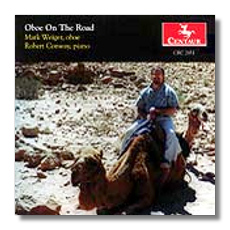
The Internet's Premier Classical Music Source
Related Links
- Latest Reviews
- More Reviews
-
By Composer
-
Collections
DVD & Blu-ray
Books
Concert Reviews
Articles/Interviews
Software
Audio
Search Amazon
Recommended Links
Site News
 CD Review
CD Review
Oboe on the Road

- Miguel del Águila: Sommergesang
- Robert Sibbing: Ballad, Blues & Rag
- David Gompper: Anon
- Walter Piston: Suite
- Michael Angell: Noon Song
- Arnold Rosner: Sonata, Op. 54
Mark Weiger, oboe
Robert Conway, piano
Centaur CRC2451 58:31
Summary for the Busy Executive: Two masterpieces and the rest lovely.
I'll confess up front. I know Rob Conway. We were at the University of Michigan at the same time – he a student of Theodore Lettvin and me grinding away as grad student in the English department. We even boarded together. New music genuinely interested him, and I have him to thank for my appreciation of the late works of Roberto Gerhard. However, he didn't send me this CD, and we haven't spoken or written to one another for at least twenty years, having – as is usual with grad students – lost touch once we moved on. In fact, seeing his name again pleasantly surprised me. At any rate, the CD spotlights oboist Mark Weiger.
I love the sound of an oboe. All the works on the program show the instrument at its lyrical best. None of the pieces demand squawks, squeaks, or any "extended" sounds from the player, with the exception of the occasional jazz-type "smear." As usual with such collections, some pieces come off better than others. Miguel del Águila's Sommergesang goes on a bit too long, despite its attractive material, including an agitated samba. The partnership between Weiger and Conway impresses most, even though both get their chance to shine – Conway in an extended solo and Weiger with delicate, flute-like high work and a big, loud tone that never breaks. Robert Sibbing's Ballad, Blues & Rag takes a look at American pop: a Vernon Duke-ish ballad with a Fats Waller break, an elegant blues, a Joplinesque rag. The idea of the music is different kinds of swing. The duo does best in the "Ballad." In the other two, they move stiffly, rather than with the graceful lope the music really calls for. The "Rag" suffers most, although they loosen up a bit for the trio. Anon by David Gompper is the kind of well-written, genteel, and ultimately faceless piece I don't really care about – music I associate with what went on among University of Michigan composition students in the Seventies. Gompper's attendance at the U of M doesn't surprise me. However, it's the only clunker, and, if you care for this kind of thing, the performers treat the work with great sensitivity and penetration. Michael Angell's Noon Song, on the other hand, uses much of the same idiom as Gompper, but in a much more personal way. It exploits the meditative qualities of the instrument as it worries a minor third into an efflorescence of pastel lyricism. Again, the duo lavish great care on the piece.
Walter Piston's Suite has become, with the Hindemith and Poulenc sonatas, standard rep for the instrument. It's early Piston, hailing from around 1931, and rather aggressively neoclassic in a Stravinskian way. Little "back-to-Bach-and-Mozart" riffs pop up throughout its five brief movements, although within a modern harmonic vocabulary. Piston moved on from this kind of obvious evocation fairly quickly, and one does see signs of that letting-go even here. The "Sarabande" takes on a hint of a tango. The "Menuetto" is as much a waltz, though pastoral in feeling. The most remarkable movement, the "Nocturne," with more than a hint of Chopin, shows most clearly the neoclassical Romantic Piston became.
If the Piston is in fact a classic, the Arnold Rosner sonata should be. It's one of those pieces that grab you from the opening bars. Rosner takes a bone-simple harmonic idea and makes magic. I heard it, broke into a smile, and thought, "Well, I'm in good hands." I don't hesitate to call the sonata a masterpiece. It convinces with the same force and immediacy as (on a grander scale, of course) Bartók's Concerto for Orchestra does. The opening "Allegro moderato" sings effortlessly and beautifully. It sounds absolutely and disarmingly uncontrived, which probably means that Rosner worked it with tremendous craft. It fits the oboe like Spandex on a chorus girl. The "Adagio," following such a lighthearted opening, opens up vast spaces and soaring heights. I can afford no greater accolade than to say it reminds me of similar movements in Bloch. The "Vivace" dances, with an evocation of the Middle East – not only great abandon, but touches of melancholy and even of heroism. From the opening movement to the last bars of the finale, we travel a great emotional distance on, really, the fairly slender means of oboe and piano. This is an epic in little – once heard, a part of the listener. Rosner does this in piece after piece. He has created a personal idiom out of common materials – a voice as individual as Vaughan Williams. It offends my sense of justice that so few people know this music. He's written symphonies. When will these be heard?
Again, Weiger and Conway's partnership is precisely that – a chamber-music ideal. Each one knows what the most important phrase in the texture is at any given moment and have the smarts to step forward or back appropriately. Weiger has a solid tone at every dynamic and every part of the instrument's range. Conway has the fingers to pick out whatever line he needs, even from at times thick textures. More important, they often penetrate to the core of each work – least successfully in the pop-inspired Sibbing, but dead-on everywhere else. With the Rosner and the Piston, a disc to treasure.
Copyright © 2001, Steve Schwartz




















